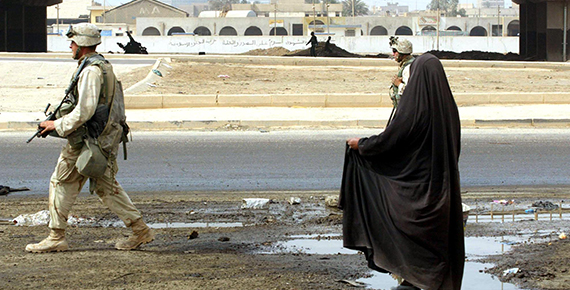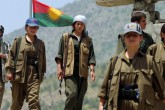Wrapped in a US flag, as the statue of the late Saddam Hussein was being taken down by the troops a decade ago, on April 9, 2003, a crowd of people was crowing organized by Ahmet Chalabi, who was whispered in his ear a forlorn hope that he would be the new leader of Iraq in the post-occupation period,. The United States carrying out the second occupation of the millennium, believed, with her neocon missionary spirit in the world of post-September 11, that she fortified the status quo in the Middle East in a way to remain unchanged for a long time. After a decade has passed, the actors who were political and actual subjects of the US occupation of Iraq underwent profound changes. People who contemplated to benefit largely from the occupation and the political atmosphere, lost.
The US had to say farewell to the 20th century which she had welcomed with the motto of “The American Century”. The most heated debate in the early 21st century had transformed into one about a “Post-American” era because of the Iraqi occupation. The US, in no time, had to rid of her neocon missionaries who had smashed down her geopolitical posture, for it was impossible for the “American Empire” to carry their burden for a long time. Even the elimination of the Neocon team was not sufficient to save the Republican administration. Coupled with the cost of the occupation and the transformation of the global financial crisis into an economic depression rapidly, the Republican administration had to leave its seat to the Democrats. Therefore, the heavy missionary discourse of the Neocon period left its place to the American passivism which has clearly become the subject of criticisms. With the “shift to Asian axis” in the US security strategy added to this, the balancing act of the US in the Middle East and North Africa completely invalidated the discourses during the Iraqi occupation.
THE OCCUPATION OF IRAQ AND THE MIDDLE EAST
Ten years ago, the Justice and Development Party (AK Party), which had newly come to power, found itself in the middle of the occupation of Iraq. On one side, there was the utmost bulkiness of the old-Turkey; and on the other side was the tremendous pressure exerted by the Neocons exchanging passes with the old-Turkey. The old-Turkey foci presumed back then that the AK Party experience had already died on the vine. Turkey would have to “please her American friends” by taking part in the occupation, and thereby without needing another February 28 (1997)-style domestic intervention, the AK Party “issue” would be terminated by the skillful hands of the occupation. The government associated with the occupation would have raised grave doubts about its being “a non-puppet”, and therefore would have to come off the stage naturally. However, the AK Party orchestrated the process by a successful engineering, and Turkey became the only exceptional actor in the occupation equation. In the upcoming years, Iraq transformed into a springboard for active foreign policy moves of Turkey; therefore, made tremendous contributions to the formation of the new-Turkey’s foreign policy ground.
Iran seeing the Iraqi occupation as an opportunity to overcome its own political trap of 20 years and to save herself from Saddam Hussein, for a limited time took advantages of the rapid returns of her short-term investments. However, Iran was to see in the upcoming years how problematic a political crossroad it was to write down the cost of the Iraqi occupation as a gain on its own account. Iran, let alone breaking her isolation via Iraq, transformed into an actor alienated in the region, along with the Arab Spring factor, more so than she ever was in the modern period and in the aftermath of the Islamic revolution particularly.
Similarly, the Baath regime in Syria; whom some Neocon fanatics had wanted to remove from power together with Saddam during the occupation in Iraq, made a historic mistake by misreading its being spared of the
In this article
- Foreign Policy
- Opinion
- 1997
- 2003
- Africa
- Arab Spring
- February 28th Post-Modern Coup | 1997 Turkish Military Memorandum
- Global Actors | Local Actors
- Iraq
- Islam
- Islamic
- Islamic Republic of Iran
- Middle East
- North Africa
- Syria
- Syrian Civil War
- Syrian Conflict
- Syrian Crisis
- Türkiye's Justice and Development Party | AK Party (AK Parti)
- United States (US)


